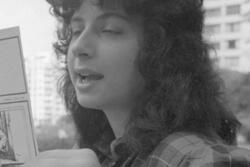Happy Women's Equality Day!
It's been 88 years since the 19th amendment gave American women the right to vote -- a right I hope we'll all take very seriously this year. I'd like to add to Lily's reflections on this anniversary the story of one Jewish woman who worked for the suffrage campaign in her homestate, Montana, in the 1910s.
Belle Fligelman was a young reporter for the Helena Independent in 1914 when she joined the suffrage cause. She was inspired by Jeannette Rankin, the chair of the state women's suffrage organization, and later served as her aide when Rankin became the first woman in Congress in 1916 (before most American women even had the right to vote!).
The suffragists had to make use of political tactics - such as speaking on street corners - that were considered quite "unladylike" and shocking at the time. Fligelman later recalled,
"I remember my first speech distinctly. I was terrified as I took my place on what was supposed to be a busy Helena street corner. Suddenly, it seemed, there was not a soul in sight. But I had something to say, so I just started talking to the world."
Soon, Fligelman had a large audience - no doubt attracted bythe novelty of a woman speaking on street corner as much as by interest in what she had to say.
But an obstacle even greater than her own fear was the reaction of her family:
"My mother was horrified. While it was all right for women to vote, she said, no respectable lady would speak on a street corner. She warned me that if I made one more speech on the street, I needn't come home. That night I slept at a hotel and charged it to my father."
This story delights me. It's a great reminder of the personal courage that activism requires, and the ways that class privilege plays into her experience, both raising the stakes for her (in the standards of"respectability") and making it easier for her to flout those standards (access to a hotel room when she's kicked out of the house).
So as I sit down to watch the Democratic Convention again tonight, I'm thinking of Belle Fligelman, who in 1974 wrote "Even now I never go to the polls without a silent thank you to those many energetic, earnest women in Montana and supporters from other states who made it possible."






